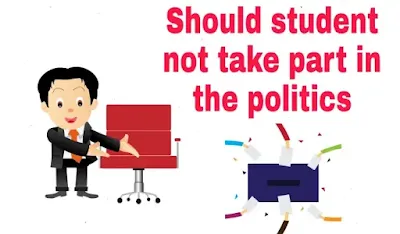Essay on Should Student Not Take Part In The Politics
Introduction:
The question of whether students should or should not take part in politics is a complex and debated issue. While some argue that political engagement fosters civic responsibility and awareness, others contend that students should focus solely on their academic pursuits.
This essay aims to explore both perspectives, weighing the benefits and drawbacks of student involvement in politics.
Arguments Against Students Taking Part in Politics:
Distraction from Academic Responsibilities:
Critics argue that active participation in politics can divert students' attention from their primary academic responsibilities. Juggling political activities alongside coursework may compromise academic performance and impede the pursuit of educational goals.
Immaturity and Lack of Experience:
Opponents believe that students may lack the maturity and life experience necessary to navigate the complexities of politics effectively. Engaging in political activities without a solid understanding of the issues at hand might lead to uninformed decisions or the manipulation of students by more seasoned political actors.
Potential for Radicalization:
Some argue that students, being more impressionable, may be susceptible to radical ideologies or extreme political viewpoints. Participation in politics could expose them to divisive ideologies, potentially polarizing campus communities and hindering the pursuit of a harmonious academic environment.
Arguments in Favor of Students Taking Part in Politics:
Fostering Civic Awareness and Responsibility:
Advocates contend that political involvement enhances students' civic awareness and responsibility. Engaging with political issues allows students to develop a deeper understanding of the democratic process, fostering a sense of responsibility toward societal issues.
Promoting Social and Political Change:
Student involvement in politics has historically played a significant role in initiating social and political change. From civil rights movements to anti-war protests, students have been catalysts for positive transformation, leveraging their collective power to influence policy and societal norms.
Learning Real-world Skills:
Participation in politics equips students with valuable real-world skills such as critical thinking, public speaking, and organizational abilities. These skills are transferable to various aspects of life and can contribute to personal and professional development.
Representing Youth Perspectives:
Students, as a demographic group, bring unique perspectives to the political landscape. Their involvement ensures that the concerns and priorities of the younger generation are represented in political discourse, leading to more inclusive and representative governance.
Conclusion:
The debate over whether students should participate in politics is rooted in a tension between the potential benefits of civic engagement and concerns about the potential drawbacks. Striking a balance between academic pursuits and political involvement is essential.
While students should remain focused on their studies, they should not be discouraged from engaging in the democratic process. Rather, educational institutions should provide a supportive environment that encourages responsible political engagement, helping students develop the skills and awareness needed to contribute positively to society.
By fostering an atmosphere of informed and respectful political discourse, students can contribute to a vibrant and participatory democracy while simultaneously pursuing their academic endeavours.
Also read:- what makes India great essay
Also read:- what is democracy and what is decorators ship
Also read:- your future depends on your aspirations essay
Also read:- Should state colleges are free to attend persuasive essay
Also read:- essay on why voting is important
Also read:- Essay on why rules are important
THANK YOU SO MUCH

I think they can because they have confidence to beat any level of politics. They should also can take part in elections on chairman level.
ReplyDelete